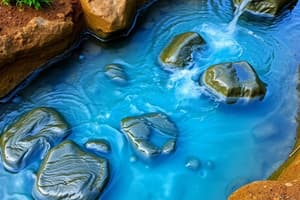Podcast
Questions and Answers
What is one of the main levels of study in ecology?
What is one of the main levels of study in ecology?
- Infrastructure
- Technology
- Economics
- Population (correct)
Which of the following is NOT a concept of zero waste?
Which of the following is NOT a concept of zero waste?
- Refuse
- Reinvest (correct)
- Reduce
- Recycle
What should environmental education emphasize according to the content?
What should environmental education emphasize according to the content?
- Global awareness of local issues (correct)
- Technological advancements
- The importance of individualism
- Capitalism
What is the primary goal of environmental science as stated in the content?
What is the primary goal of environmental science as stated in the content?
Which of the following best describes an ecosystem?
Which of the following best describes an ecosystem?
What interdisciplinary aspect does environmental education aim to incorporate?
What interdisciplinary aspect does environmental education aim to incorporate?
Ecology is derived from which two Greek words?
Ecology is derived from which two Greek words?
What is emphasized in environmental education for maintaining future sustainability?
What is emphasized in environmental education for maintaining future sustainability?
What does a high level of specific conductivity in water indicate?
What does a high level of specific conductivity in water indicate?
Which of the following factors can directly affect the biological oxygen demand (BOD) in water?
Which of the following factors can directly affect the biological oxygen demand (BOD) in water?
How does increasing population density influence water quality?
How does increasing population density influence water quality?
Which of the following is NOT a characteristic affected by temperature in water?
Which of the following is NOT a characteristic affected by temperature in water?
What is the effect of hydrochloric acid in relation to taste perceptions of water?
What is the effect of hydrochloric acid in relation to taste perceptions of water?
Which of the following best describes the role of chloride ions in natural water systems?
Which of the following best describes the role of chloride ions in natural water systems?
What primarily increases the rate of chemical and biological reactions in water?
What primarily increases the rate of chemical and biological reactions in water?
What is the significance of measuring Biological Oxygen Demand (BOD) in water quality assessment?
What is the significance of measuring Biological Oxygen Demand (BOD) in water quality assessment?
What is the primary role of producers in an ecosystem?
What is the primary role of producers in an ecosystem?
Which group of consumers primarily feeds on plants?
Which group of consumers primarily feeds on plants?
What defines a population in an ecosystem?
What defines a population in an ecosystem?
What is the role of decomposers in an ecosystem?
What is the role of decomposers in an ecosystem?
Which of the following accurately describes commensalism?
Which of the following accurately describes commensalism?
Which of the following is NOT a characteristic of an ecosystem?
Which of the following is NOT a characteristic of an ecosystem?
What is the main outcome of energy flow through an ecosystem?
What is the main outcome of energy flow through an ecosystem?
Which of the following statements about limiting factors in an ecosystem is true?
Which of the following statements about limiting factors in an ecosystem is true?
What processes are involved in the nitrogen cycle?
What processes are involved in the nitrogen cycle?
Which of the following best defines a biogeochemical cycle?
Which of the following best defines a biogeochemical cycle?
What is the main process involved in the water cycle?
What is the main process involved in the water cycle?
How does the sulfur cycle interact with the environment?
How does the sulfur cycle interact with the environment?
What role do organisms play in the nitrogen cycle?
What role do organisms play in the nitrogen cycle?
Which statement accurately represents the oxygen cycle?
Which statement accurately represents the oxygen cycle?
What is NOT a process associated with the water cycle?
What is NOT a process associated with the water cycle?
What happens to sulfur as part of the sulfur cycle?
What happens to sulfur as part of the sulfur cycle?
What is the primary function of the sulfur cycle in the environment?
What is the primary function of the sulfur cycle in the environment?
Which process is NOT part of the gaseous sulfur cycle?
Which process is NOT part of the gaseous sulfur cycle?
How is sulfur assimilated by living organisms in the sulfur cycle?
How is sulfur assimilated by living organisms in the sulfur cycle?
What role do PAHs (Polycyclic Aromatic Hydrocarbons) play in environmental chemistry?
What role do PAHs (Polycyclic Aromatic Hydrocarbons) play in environmental chemistry?
What effect can nutrient leaching from agricultural land have on water bodies?
What effect can nutrient leaching from agricultural land have on water bodies?
Which of the following is a pathway for sulfur to enter the atmosphere?
Which of the following is a pathway for sulfur to enter the atmosphere?
What can urban runoff lead to in the context of the sulfur cycle?
What can urban runoff lead to in the context of the sulfur cycle?
What does the sedimentary sulfur cycle primarily rely on for releasing sulfur?
What does the sedimentary sulfur cycle primarily rely on for releasing sulfur?
Flashcards are hidden until you start studying
Study Notes
Human Perceptions of Water Quality
- Water should be free from odor and taste for safe human consumption.
- Increased population density can elevate individual stress levels.
- Sour (hydrochloric acid), salty (sodium chloride), sweet (sucrose), and bitter (caffeine) tastes indicate various properties of water.
Physical Properties and Characteristics of Water
- Temperature influences critical physical properties such as thermal capacity, density, and viscosity.
- Increasing temperature accelerates chemical and biological reaction rates in water.
Conductivity and Water Purity
- Specific conductivity indicates water purity; high levels suggest contamination.
- High conductivity signifies a rise in dissolved impurities, impacting the overall quality of water.
Biological Oxygen Demand (BOD)
- BOD measures the oxygen required for decomposing organic materials by microorganisms.
- A higher BOD reflects more biodegradable organic matter present in water.
Chemical Parameters of Water
- Chloride ions occur in all water types; low concentrations are normal in natural systems but rise with sewage contamination.
Importance of Environmental Education
- Interdisciplinary approach to equip individuals with knowledge and skills to address environmental challenges.
- Emphasizes awareness, participation, and understanding of environmental impacts.
Goals of Environmental Science
- Aim to create an environmentally conscious global population equipped with skills and knowledge for sustainable solutions.
- Education must encompass all environmental aspects and foster a long-term perspective on ecological consequences.
Ecosystem Understanding
- Ecosystem includes living and non-living elements in a defined area, maintaining energy flow and chemical cycles.
- Biotic components include producers (autotrophs), consumers (heterotrophs), and decomposers; each plays a critical role in nutrient recycling.
Energy Circuits in Ecosystems
- Energy flow through ecosystems involves biogeochemical cycles affecting all chemical elements.
Biogeochemical Cycles Overview
- Cycles such as nitrogen, oxygen, phosphorus, and sulfur describe the movement of essential elements through various earth systems.
Nitrogen Cycle
- Involves nitrogen transformation from atmosphere to organisms through processes like fixation, nitrification, and denitrification.
Water Cycle (Hydrologic Cycle)
- Continuous movement of water through evaporation, condensation, and precipitation vital for sustaining life.
Oxygen and Sulfur Cycles
- Oxygen cycle involves ongoing production and consumption essential for life.
- Sulfur cycle describes sulfur's transition between soil, air, and water, influencing ecological health and food webs.
Applications of Environmental Chemistry
- Awareness of heavy metal contamination from industrial sectors affecting land and water ecosystems.
- Noting the impact of pollutants like PAHs from oil spills, necessitating environmental chemistry and assessment techniques.
- Addressing agricultural nutrient leaching, which can lead to issues like algal blooms and eutrophication in water bodies.
Studying That Suits You
Use AI to generate personalized quizzes and flashcards to suit your learning preferences.




